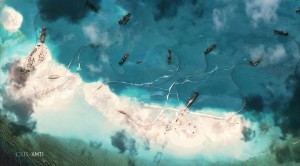BAGHDAD — The U.S. Embassy confirmed Sunday that “several” Americans have gone missing in Iraq, after local media reported that three Americans had been kidnapped in the Iraqi capital.
U.S. Embassy spokesman Scott Bolz said, “We are working in full cooperation with Iraqi authorities to locate the missing Americans.”
Bolz did not identify the missing Americans or say what they were doing in Iraq.
State Department spokesman John Kirby said that “due to privacy considerations” he had nothing further to add about the missing Americans. “The safety and security of Americans abroad is our highest priority,” Kirby said.
The comments by U.S. officials came after the Arab news channel, al-Arabiya, citing its own sources, reported that three Americans had been kidnapped by militias in Baghdad.
Iraqi media reports said the Americans went missing in south Baghdad on their way to Baghdad International Airport. A Western security official, speaking on condition of anonymity because he was not authorized to brief the media, said Sunday that he had been told that three Americans went missing 24 to 48 hours ago.
There were no immediate claims of responsibility. Kidnappings in Iraq have been carried out by the Islamic State group and Shiite militias as well as criminal gangs demanding ransom payments or disgruntled employees seeking to resolve workplace disputes.
The incident comes after a week that has seen a deterioration of security in and around the Iraqi capital after months of relative calm.
The Islamic State group claimed a number of attacks in Baghdad and neighboring Diyala province last week that killed more than 50 people, including a high profile attack on a mall in the Iraqi capital. The string of IS attacks on civilian targets within areas of Iraqi government control follow battlefield losses, most recently in western Iraq. Last month, Iraqi troops pushed IS fighters out of the center of Ramadi, the provincial capital of Anbar province in Iraq’s Sunni heartland.
In acts of apparent reprisal, armed gangs residents identified as Shiite militias, attacked Sunni owned businesses and mosques in Diyala province just north of Baghdad. After IS was pushed out of the province, security there was left almost entirely in the hands of Shiite militias.
Responding to a call to arms from Shiite clerics in Iraq after the Islamic State group swept across the country’s northern and western provinces in the summer of 2014, Shiite militias in Iraq now wield more power than the country’s regular security forces and military.


